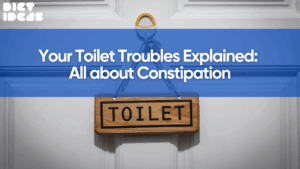Are you always sitting in the toilet, waiting for something to come out but nothing happens?
You might be dealing with constipation but don’t worry! It is a fairly common issue that can happen when there is a lack of dietary fibers, fluids and exercise. Sometimes, medication or health conditions or medicines can make it worse too.
In Asia, constipation rates vary widely from 10% to 98.4% among adults. The most frequently experienced symptoms are:
- Straining during bowel movements (82.8%)
- Passing lumpy or hard stools (74.2%)
- Feeling like you didn’t fully empty your bowels (68.1%)
So what exactly is constipation?
Constipation means changes in your bowel habits, like not going to the toilet as often as usual or finding it difficult to pass stool. Generally, constipation is defined as having three or fewer bowel movements per week.
When your stool moves slowly through your colon, the body absorbs more water, making it hard, dry and difficult to pass. [1,2,3]
Common Causes of Constipation
- Low fibre intake
- Inadequate fluid intake
- Lack of physical activities
- Regularly ignoring the urge to go to the toilet
- Changes in diet or routine
- Side effect of certain medications like painkillers or antidepressants [1,2]
Why Diet Matters
Dietary factors, particularly fiber intake from fruit and vegetable consumption play crucial roles in promoting regular bowel movements and preventing constipation. [4]
One of the top reasons for constipation is not getting enough fiber, a type of carbohydrate that your body can’t digest but your gut bacteria loves!
There are two main types of fiber [5]:
Insoluble Fiber | Soluble Fiber |
Soften stool, making it easier to pass | Improve digestion and lower blood sugar |
Examples: whole grain bread, nuts, berries, kiwi | Examples: peas, beans, banana, carrots |
One should consume 20–30 grams of fiber daily. Hence, aim for 3 servings of vegetables and 2 servings of fruits each day, alongside other fiber-rich foods such as whole grains, nuts, beans and legumes. For instance:
- Carrots: 1.1g per 100g
- Whole grain bread: 6.1g per 100g
- Almond: 15.5g per 100g [6,7]
Don’t forget fluids! Water keeps stool soft and easier to pass.
- Drink 6–8 glasses (1.5-2.0 liter) of plain water daily
- Include soups, beverages and juice, preferably low in sugar, salt and fat
- Stay away from caffeine and alcohol, which may dehydrate you
- Drink more liquids during exercise or in hot weather [8,9]
Simple Habits to Fight Constipation
- Eat more fibres
- Stay hydrated
- Stay active and exercise regularly
- Never ignore the urge to go to the toilet
- Stick to a toilet routine
- Manage your stress
If this doesn’t help, talk to a doctor or a dietitian.
Stronger gut, stronger you! It is time to take control of your gut health!
References
- Mayo Clinic. (2025, April 15). Constipation – symptoms and causes. Mayo Clinic. https://www.mayoclinic.org/diseases-conditions/constipation/symptoms-causes/syc-20354253
- NHS.(2023,September 3).Constipation. NHS. https://www.nhs.uk/conditions/constipation/
- Patimah, A. W., Lee, Y. Y., & Dariah, M. Y. (2017). Frequency patterns of core constipation symptoms among the Asian adults: a systematic review. BMC Gastroenterology, 17(1). https://doi.org/10.1186/s12876-017-0672-z
- Huo, J., Wu, L., Jinming Lv, Cao, H., & Gao, Q. (2022). Effect of fruit intake on functional constipation: A systematic review and meta-analysis of randomized and crossover studies. Frontiers in Nutrition, 9. https://doi.org/10.3389/fnut.2022.1018502
- Norris, T. (2017, August 22). What’s the Difference Between Soluble and Insoluble Fiber?Healthline;HealthlineMedia. https://www.healthline.com/health/soluble-vs-insoluble-fiber#sources-of-fiber
- Ministry of Health Malaysia. (2017). Recommended nutrient intakes for Malaysia. https://hq.moh.gov.my/nutrition/wp-content/uploads/2023/12/FA-Buku-RNI.pdf
- Home. (n.d.). Myfcd.moh.gov.my. https://myfcd.moh.gov.my/index.html
- Ministry of Health Malaysia. (2020). Malaysian Dietary Guidelines 2020. https://hq.moh.gov.my/nutrition/wp-content/uploads/2024/03/latest-01.Buku-MDG-2020_12Mac2024.pdf
- Fulghum, D. (2024, March 17). How Drinking Fluids Can Help You Manage Constipation. WebMD;WebMD. https://www.webmd.com/digestive-disorders/water-a-fluid-way-to-manage-constipation







